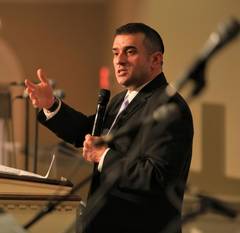- About Us
- Learning
- Resources
- Get Involved
- Membership
- Jobs
Power of Spies
06/17/2020 12:22:18 PM
Rabbi Brent Spodek
| Author | |
| Date Added | |
| Automatically create summary | |
| Summary |
 Packed into this week’s parsha is an object lesson in the reach and limits of our power.
Packed into this week’s parsha is an object lesson in the reach and limits of our power.
This week, we hear the omniscient, anonymous narrator of the Torah tell us the story of the scouts who Moses sent to the land of Israel. They were sent to see if it would work as a home for the Israelites who had just left Egypt.
The scouts came back and said, “Look – the place is fortified, the people are giants. We know that God promised it to us, but there is no way we can take it. We need a different plan.”
The people panicked, complained that Moses had only taken them out of Egypt to die. In this telling, it was as a result of this betrayal that the Holy One condemned the Israelites to wander the desert for 40 years and condemned virtually the entire generation who heard the report of the scouts to die in the desert. Only Joshua and Caleb, who were confident in God’s promise, were able to enter the land.
It seems that it was the scouts who sinned – doubting God, sowing dissent and generally wreaking havoc by telling the Israelites that they could not live in the land of Israel.
But years later, when the new generation is preparing to enter the land of Israel, Moses tells them the story of the scouts in a very different way. This time, it’s not the scouts, but the people who are to blame. As R. Alan Lew points out, they are no longer innocents, misled into disobedience; rather, in this telling, the scouts said “It is a good land that God is giving us – pack your bags!” and as Moses continues the story he chastises the new generation – who had not even been born at the time of the scouts – and says “You refused to go, you flouted the command of the Lord, and instead, you sulked in your tents.”
Why does Moses blame the people, when the first telling of the story seems to blame the scouts?
Moses puts the blame on the people – the people he is addressing – because in a real sense, those are the only people that matter.
Moses isn’t a historian and he isn’t talking about the past; he’s talking about the future. This new generation is getting ready to enter the land and there will, inevitably, be conflicts.
Spiritually speaking, the only question worth asking about any conflict is this: What is my responsibility for it? What did I contribute to this and how can I prevent it from happening again?
When things go wrong, there is enormous temptation to blame it on externals, on the evil of others or an unlucky turn of events. The Torah demands that we - as individuals - resist this temptation, no matter how strong it may be and no matter how strongly rooted in fact or history it might be.
Of course, what is true on an individual level can be false and even harmful on a societal level. An individual can respond to the reality they encounter; a group working in concert can shape the reality they encounter.
Even individually, we are immensely powerful, beyond our wildest dreams – but only in a very narrowly defined arena. It is only here and now, in this moment, in this place – in the present – that we can act. We can’t act in the past, we can’t act in the future and we can’t act for someone else. Only here and now.
We often squander our ability to act in the present because we are lamenting our inability to act in the past.
That’s what Moses was trying to make clear to the people about to enter the land – things will happen. Scouts will give bad reports, enemies will attack, famine will unfold. Our power – in its grandeur and in its limits – is in how we react.
There is only ever this moment. That is the only place we have power; that is the only place the Divine is present. We can be as open to this moment as the sukkah is to the sky or we can let this moment pass, while we think about what could have been and should have been.
Tue, October 21 2025
29 Tishrei 5786
RABBI BRENT SPODEK

Join Our Mailing List
Privacy Settings | Privacy Policy | Member Terms
©2025 All rights reserved. Find out more about ShulCloud


